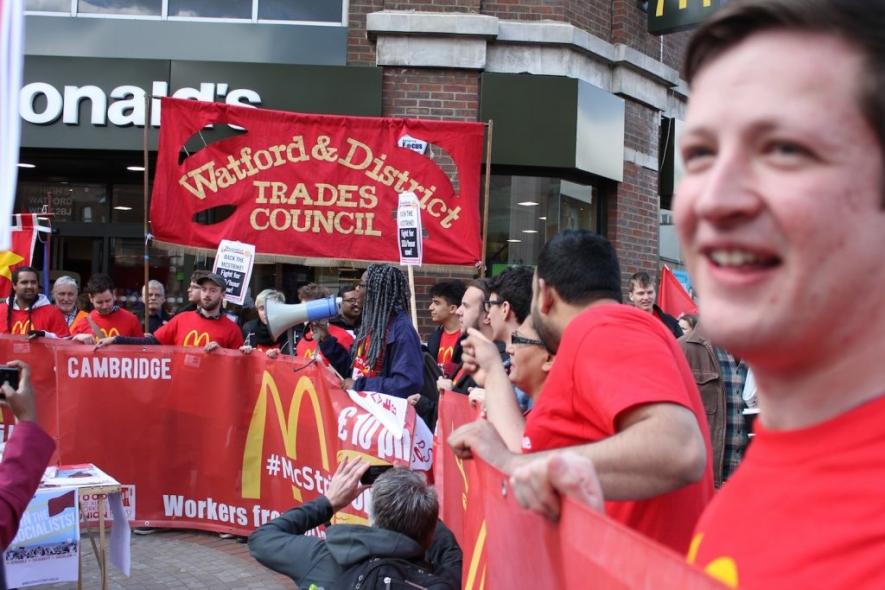‘McStrike ‘Marks key Moment in Fast Food Workers’ Struggle in UK

The workers sought a £10 minimum wage, fixed contracts and the right to unionize. Photo Credit: Will Chevers/wiserd.ac.uk
This year’s International Workers’ Day saw a fresh assertion by McDonald’s workers of their rights in the United Kingdom as they protested against low wages and an oppressive contract system. Workers from six outlets took part in the protest that marks the latest advance in the sector in the country after a historic strike in September and balloting regarding these issues in certain outlets of the company in April.
The demands of the workers include a minimum wage of £10 an hour, an end to zero hour contracts and the right to organize. Following the strike in September, McDonald’s announced a pay hike in January but it was applicable only to workers in company-owned outlets, which form only 25% of the total number in the country. The pay hikes also differed based on region and age of employees, leading to only a fraction of employees benefiting. Following the wage hikes, staff above 25 in company-owned outlets are paid between £8 and £10 per hour. The minimum wage as of May 1 is £7.83 though the living wage in London, an informal benchmark, is at £10.20. McDonald’s chief executive Steve Easterbrook is believed to earn about £5,700 an hour.
Ahead of the May 1 protest, McDonald’s worker, Annalise Peters (20) wrote about the precarious conditions of employment, especially due to the prevalence of zero hour contracts. McDonald’s is one of Britain’s largest employers to use the system, which does not assure employees fixed working hours. This leaves employees, who are already struggling for a livelihood, at the mercy of the management. After intense pressure, McDonald’s offered its workers fixed contracts but claimed that most of them were happier with the zero-hour system. However, workers like Annalise claim that the offer by the corporate was not serious and workers found it difficult to access the new contracts.
The striking employees are supported by the Bakers, Food and Allied Workers Union (BFAWU) and have received the backing of Labour leaders Jeremy Corbyn and and John McDonell, as well as a number of Members of Parliament.
Over the past few years, workers across the world have been in the forefront of a challenging the exploitative practices of fast food giants, who have capitalized on massive unemployment to hire workers at a pittance. The Fight for $15 movement that began with walk-outs by fast food workers in the US now includes workers from various sectors seeking a minimum wage of $15. In April, workers in six US cities took to the streets after McDonald’s failed to keep its promises regarding wages. In New Zealand, unions have claimed the fast food giant has stolen $9 million in workers’ wages.
The fast food sector and its employment practices have been the site of the rampant explorationof some of the most vulnerable sections of society. However, the steady mobilization of workers offers hope that a change might be on the horizon.
As Annalise Peters wrote:
I’ll be able to spend a little less time focusing on McDonald’s and more on pursuing my studies. With £10 an hour in my pocket, I’ll have a bit more time to enjoy my social life. Our movement is growing and it’s growing really quickly. McDonald’s, watch out. We’re standing up for ourselves and others.
Get the latest reports & analysis with people's perspective on Protests, movements & deep analytical videos, discussions of the current affairs in your Telegram app. Subscribe to NewsClick's Telegram channel & get Real-Time updates on stories, as they get published on our website.
























